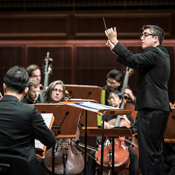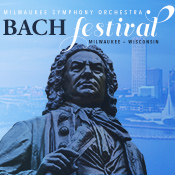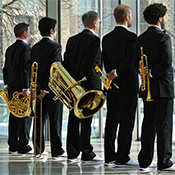
MSO Brings Bach’s Christmas Oratorio to Milwaukee
David Lewellen
PUBLISHED
Tagged Under: 2024.25 Season, Chorus
Milwaukee audiences that experience Bach’s Christmas Oratorio for the first time this week will actually be getting a glimpse of a beloved annual holiday tradition in Germany.
Daniel Ochoa, who will sing the baritone solos with the Milwaukee Symphony, grew up in Bach’s adopted hometown of Leipzig — and sang in the same children’s chorus as Music Director Ken-David Masur. “The Christmas Oratorio is such a tradition,” he said. “Leipzig has maybe 500,000 people, similar to Milwaukee, and each year, in the weeks before Christmas, there will be 50 performances or more. Every small church that has a choir will put all their effort and money into performing the Christmas Oratorio.”
As a teenager and young adult, Ochoa often sang the piece “in very small churches for almost no money. It’s something I grew up with as a singer.”
The Christmas Oratorio is actually a series of six cantatas, each lasting 25 to 30 minutes, that Bach wrote to be performed on successive days during the Christmas season at St. Thomas Church in Leipzig, where he was the music director. The MSO will perform the first three cantatas at this weekend’s concerts, which Ochoa said is a common practice in Germany.
The obvious parallel in the United States is Handel’s Messiah — which the MSO will not perform this December, for the first time in many years. By contrast, Milwaukee Symphony Chorus Director Cheryl Frazes Hill said that not a single member of the chorus has sung the Christmas Oratorio before. When she is rehearsing, as the chorus works on the unfamiliar German text, she might say, “This part is like ‘Glory to God’ in Messiah” — which helps the singers put the music in context.
She is using a group of more than 80 singers — considerably larger than Bach would have had, but she wants as many as possible in the Milwaukee Symphony Chorus to learn it. “These are important works to have in our repertoire,” she said. “It’s a little big for the piece, but it enables as many people as possible to experience it without compromising the work.” She hopes that the Christmas Oratorio will return to the MSO’s season before too many years elapse, because “it’s important for the audience to know it, too.”
About the prospect of a Christmas without Messiah, she said, “I love them all, and it’s nice as a singer to do something a little different.” Still, this season, the chorus made sure there was extra rehearsal time to enable them to learn a totally new piece. Not every number is complex, but even the chorales, with all voices singing the same rhythm, can be tricky. “When we first started rehearsing, every chorale sounded the same,” Frazes Hill said. “Where Ken takes the fermata, how long he holds it, how he gets there – that’s as demanding as the melismas,” or long runs of notes on one syllable.
Masur came to the chorus’ rehearsal last week, ahead of his usual schedule, and “it changed our sound,” Frazes Hill said. “It gave me a road map for my next rehearsal. It means a lot to Ken. This is the tradition that he grew up with.”
Ochoa’s musical repertoire spans centuries, but he said, “I come back to Bach every year. Bach is my home. I can relate to it very deeply, the way he puts himself behind the music and his service to God.” While concentrating on music for the next week’s church service, Bach “never imagined becoming so famous,” Ochoa said.
He has performed the piece in many other countries, but his performances this week in Milwaukee will mark his American debut. In singing the Bach oratorio, “I’m bringing a very important part of my culture to the world,” he said. “Something happens, like a very deep mystery. I always know that’s the reason I became a singer.”



